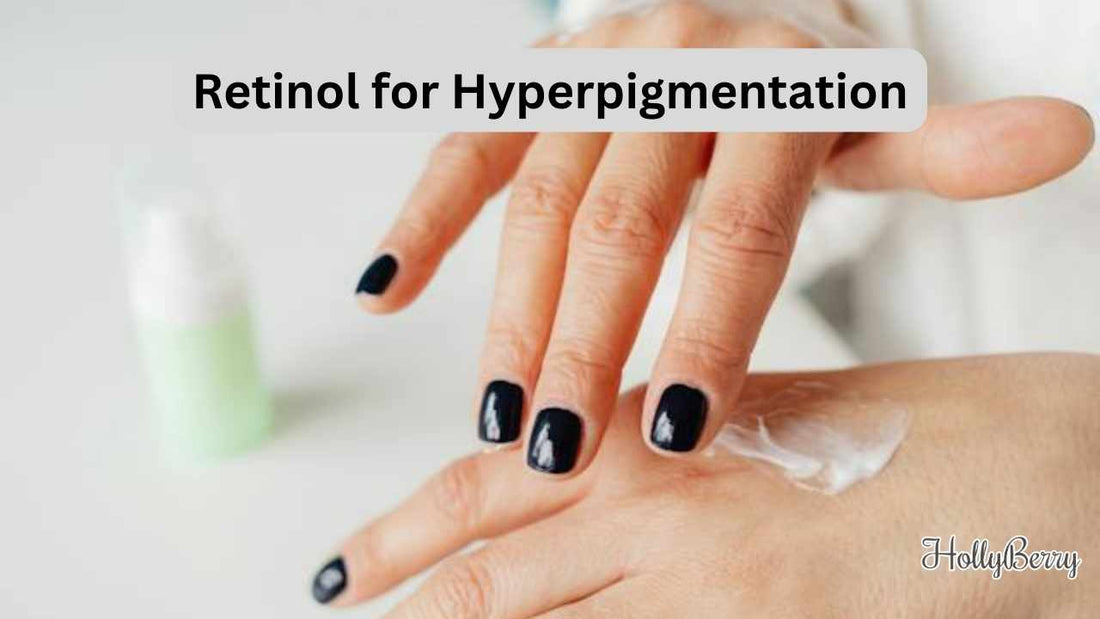
Retinol for Hyperpigmentation
Share
Efficacy and Application Guide

Hyperpigmentation, characterised by darkened patches on the skin, is a common dermatological concern that often requires targeted treatment to manage. One effective ingredient in the battle against this condition is retinol, a derivative of vitamin A renowned for its skin-renewing properties.
Serving as an over-the-counter remedy, retinol works by promoting the turnover of skin cells, which aids in the gradual fading of hyperpigmented spots.
The action of retinol not only assists in the lightening of dark patches but also stimulates collagen production, supporting the skin's structure and resilience against further damage.

It's crucial, however, for users to be aware of potential side effects such as dryness, irritation, and increased sensitivity to the sun, making the integration of sunscreen into one's skincare routine alongside retinol use an absolute necessity.
While prolific in the skincare market, not all retinol products are created equal. It's important to select a concentration and formula that align with individual skin types and concerns, with options ranging from gentle formulations for beginners to more potent versions for those who have built up a tolerance.
Consistent and informed application of retinol can yield visible improvements in the appearance of hyperpigmentation, contributing to a more even skin tone over time.
Understanding Retinol and Its Benefits for Hyperpigmentation
This section delves into how retinol, a derivative of Vitamin A, contributes to improved skin health by targeting hyperpigmentation.
The Science of Retinol and Skin Health
Retinol plays a pivotal role in skin health through its ability to accelerate cell turnover.
This vitamin A derivative promotes the shedding of dead skin cells and the renewal of skin surface, which can lead to enhanced collagen production, subsequently reducing the appearance of fine lines and wrinkles.
Targeting Hyperpigmentation with Retinol
Retinol is effective for diminishing hyperpigmentation, such as dark spots and melasma. It works by interfering with melanin production and distribution, helping to break up and fade pigmentation, leading to an even skin tone.
Retinol Formulations and Strengths
Retinol is available in various formulations and strengths, from mild over-the-counter serums to more potent prescription retinoids like adapalene and tazarotene. Products may range from 0.25% to 1% retinol for topical usage.
Application Techniques and Best Practices
When applying retinol:
- Use a pea-sized amount for the entire face.
- Apply to clean, dry skin, starting 2-3 times weekly, building up tolerance.
- Follow up with a nourishing moisturiser to counteract dryness.
Combining Retinol with Other Skin Care Ingredients
For enhanced results, retinol can be paired with skin care ingredients such as:
- Hyaluronic acid for hydration.
- Niacinamide to reduce inflammation.
- Vitamin C, peptides and antioxidants for additional anti-aging benefits.
Protecting Skin from Potential Retinol Side Effects
Side effects of retinol include dryness, redness, and irritation, more so in sensitive skin types. To minimise risks:
- Begin with lower concentrations of retinol.
- Incorporate a broad-spectrum sunscreen into your daily routine.
- Consider fragrance-free formulations to reduce potential skin irritation.
Always conduct a patch test before introducing retinol into your skin care regimen and consult a healthcare provider if you have concerns, particularly during pregnancy.
Addressing Common Concerns and Myths About Retinol
Retinol, a derivative of vitamin A, is frequently used in skincare for its ability to promote cell turnover and improve hyperpigmentation. This section explores common concerns and myths surrounding its usage.
Debunking Misconceptions About Retinol and Hyperpigmentation
Retinol does not serve as an exfoliating agent. It works by enhancing skin cell regeneration to help diminish the appearance of hyperpigmentation.
Concerns that it may cause pigmentation issues are often based on misunderstanding. When used correctly, retinol may even skin tone and improve texture.
Retinol for Different Skin Types and Conditions
All skin types, including sensitive skin and skin of colour, may benefit from retinol. Special considerations are necessary for skin conditions such as eczema.
A gradual introduction and layering with moisturisers can help mitigate potential irritation. Sunscreens are crucial to protect skin undergoing retinol treatments.
Retinol Use During Pregnancy and Nursing
The safety of retinol during pregnancy and nursing is often questioned. However, it's widely recommended to avoid retinol during these periods. Alternative ingredients, such as vitamin C and kojic acid, may be safer options for managing hyperpigmentation.
Choosing the Right Retinol Products
Selecting retinol products from reputable brands like Neutrogena or The Ordinary can lead to better outcomes. Products come in various formulations, including creams, serums, and lotions, catering to different preferences and needs.
| Formulation | Characteristics | Suitable For |
|---|---|---|
| Creams | Richer, more moisturising | Dry skin |
| Serums | Lightweight, higher potency | All skin types |
| Lotions | Light, often hydrating | Oily skin |
Consulting with Dermatologists
Dermatologists offer professional advice and skin assessments, tailoring retinol prescriptions to individual Fitzpatrick skin types and needs. They can also provide guidance on mitigating side effects and maximising benefits.
Long-term Use and Maintaining Skin Health
Retinol's long-term effects on skin health are generally positive, contributing to a more even complexion. Consistent use, paired with a suitable skincare routine, helps maintain results. Regular consultation with a dermatologist can help address any skin changes over time.
Retinol Alternatives for Hyperpigmentation
Alternatives to retinol include vitamin C, kojic acid, arbutin, and prescription options like hydroquinone. These alternatives may be suitable for those who experience severe skin irritation from retinoids or for whom retinoids are contraindicated.
Each ingredient or product type comes with its own set of recommendations and contraindications, which ought to be considered carefully to maintain overall skin health.
